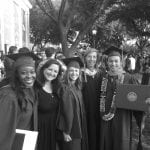Capstone research projects:
All capstones are required to have three aspects: academic research on a sustainability related topic, project-based interaction with a real site and stakeholders, and some measurable aspect of the work outcome. [* – Starred projects were selected as a Commitment Project, and students awarded to be participant at CGIU (Clinton Global Initiative University) ]
 Jessica Masangu_Beya, Transportation and Community
Jessica Masangu_Beya, Transportation and Community
Utilizing Transportation as a mean to balance social equity, build equitable communities and improve residents behaviors and values.
 Leroy Ahwinahwi, Implementation of Solar as a first stage for sustainability for Schools
Leroy Ahwinahwi, Implementation of Solar as a first stage for sustainability for Schools
Promoting Sustainability at St Philips School and Community Center and making it a net zero community, starting with the implementation of renewable solar energy solutions at the Main Campus.
 Yessenia Gracia, A Right to the City: Feminist sustainable urban design and transportation
Yessenia Gracia, A Right to the City: Feminist sustainable urban design and transportation
Focused on improving minority and underserved communities in Waco, Texas, Greater Exploration and proposal of a more efficient and inclusive urban and transportation design with a feminist approach to guarantee the use of public space. A focus on the recent theory and social movement concerning the impact of the built environment on women.
 Grant Amlani, Breaking the Cycle: Moving Toward Circular Economy Practices
Grant Amlani, Breaking the Cycle: Moving Toward Circular Economy Practices
Moving towards a circular economy with recycling, and how such efforts can be encouraged and enhanced through best practices at the campus and local level. Using Southern Methodist University campus and North Texas region Grant examines existing policies and creates guidance and strategies to lead action.
 Rodney Fanner, Using non-traditional education deployment to improve Equity, Development, and Community Engagement *
Rodney Fanner, Using non-traditional education deployment to improve Equity, Development, and Community Engagement *
Focused on improving minority and underserved communities in Waco, Texas, Greater Atlanta, and potentially others using a focused and non-traditional approach to development. Capstone will focus on a education delivery methodology which will serve as a catalyst to improving the locations initially and sustainment long-term.
 Alejandra Hinojosa, Community and Place
Alejandra Hinojosa, Community and PlaceRepurposing historic architecture for modern uses as a means of preservation, and utilizing large and small scale urban gardens as gathering places to build social capital, community connections, and knowledge about where & how our food grows.
 Emily Roberts, Social Equity and Housing in Dallas
Emily Roberts, Social Equity and Housing in Dallas
Focused on affordable housing, the social equity issues surrounding it, and housing policy in the Dallas area.

Chaquora Stukes, Textile Waste and Recycling for more Sustainable Fashion (2022)
Taking a look at the textile industry and ways to decrease post consumer waste through recycling.
 Nehal Abdelfattah, Walk and Talk * (2021)
Nehal Abdelfattah, Walk and Talk * (2021)Promoting walking to school among children through tactical urbanism and community engagement, and measuring its impact through surveys, interviews and GIS.
 Matthew Handy, The Impact of Sustainable Design: Cost-Benefit Analysis and the Public Health of New Orleans * (2022)
Matthew Handy, The Impact of Sustainable Design: Cost-Benefit Analysis and the Public Health of New Orleans * (2022)
In 2016 the US Department of Housing and Urban Development (HUD) awarded the City of New Orleans $141.2 million from the National Disaster Resilience Competition to fund ongoing sustainable development programs that aim to improve the resiliency of New Orleans. This capstone will undertake neighborhood assessment to analyze whether these programs have succeeded in enhancing not only the built and natural environments in city neighborhoods, but also health and well-being of their residents as intended.
 Christian ‘Stan’ Lanier, Barriers to Confident and Waste-free Fishing in Dallas* (2021)
Christian ‘Stan’ Lanier, Barriers to Confident and Waste-free Fishing in Dallas* (2021)Determining how to make both fishing and disposal of recyclable monofilament line more accessible along the Trinity wetlands within Dallas.
 Erik van Bloemen Waanders, Forest preservation, Tiny forests, and Precision agriculture.* (2022)
Erik van Bloemen Waanders, Forest preservation, Tiny forests, and Precision agriculture.* (2022)Preservation of green space as well continuing to create and build upon more areas and opportunities for tiny forests and agriculture in urban areas.
 Collin Yarbrough, Embedded Environmental Justice: Human Centered Design as a tool for Undergraduate and Engagement * (2021)
Collin Yarbrough, Embedded Environmental Justice: Human Centered Design as a tool for Undergraduate and Engagement * (2021)
By engaging undergraduate students in EJ projects through CB participatory action research, the project seeks to increase knowledge of HCD as an engineering research tool and strengthen the link between community work and CEE . Re-centering neighborhood perceptions and concerns as integral to research design, the project uses community-based response to drive site investigation and cleanup. Dallas Environmental Justice Archive
 Lauren Melendez, Wind Powered Motor Lifeboats: Integrating wind energy at Coast Guard bases * (2021)
Lauren Melendez, Wind Powered Motor Lifeboats: Integrating wind energy at Coast Guard bases * (2021)The Coast Guard works 24/7 to ensure the safety of the local community and needs a reliable source of energy to continue its missions, especially during natural disasters. Coast Guard bases constantly use power for radio communications and cyber security, while the boats work on a combination of shore power and gasoline/ diesel fuel. By harnessing coastal winds through small wind turbines, the Coast Guard can continue its missions sustainably.
 Juan Rios, Fast & Flexible; Alternative Energy Components for COVID and Beyond (2021)
Juan Rios, Fast & Flexible; Alternative Energy Components for COVID and Beyond (2021)
A project is to design and manufacture renovations to the SMU FSAE race trailer, including sustainable options not only for storage, alternative energy power source, energy storage, and workspace, but the associated improvements in team morale, and the opportunity for younger members to physically work on the car, even during COVID-19.
 Brenna Wurm, Do unsustainable methods in ‘Animal Crossing’ alter player’s perception of real-world sustainability? (2020)
Brenna Wurm, Do unsustainable methods in ‘Animal Crossing’ alter player’s perception of real-world sustainability? (2020)
In the global pandemic many have turned to video games to occupy their time and the release of ‘Animal Crossing: New Horizons’ in March 2020 saw its popularity increase with player self-isolating. Players build their ideal societies from the ground up, tasked with planning an island of civic buildings, shops and residents, using natural resources to construct and build, manipulating flower pollination and exploiting fruit trees, fish and bugs. While providing a sense of escapism, the game is a false reality, where users partake in systematic unsustainable environmental methods in order to achieve their goals.
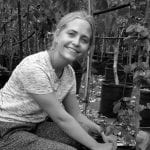 Meredith Perot, Greening Schools: Using landscape to illuminate sustainability for kids (2020)
Meredith Perot, Greening Schools: Using landscape to illuminate sustainability for kids (2020)
Students participate in this tree planting project on their school campus, producing a collaborative landscape plan for the administration. Working within the local climate and environment opens the door to discussions of larger sustainability issues, and empowers students at Dallas International School to make educated decisions about trees choices for their geography. Despite online teaching students are able to spend time outdoors on campus site visits and neighborhood tree ‘scavenger hunts’.
 Dominic Dominguez, Community Gardening for Stress Migration & Wellness During COVID-19 * (2020)
Dominic Dominguez, Community Gardening for Stress Migration & Wellness During COVID-19 * (2020)
The COVID-19 pandemic can be stressful for individuals and communities, inciting fear and anxiety in adults and children, contributing to isolation and loneliness. During this pandemic, some have turned to community gardens to combine the cultivation of food, community well-being, and individual health; social interaction is combined with open space and air, where community engagement can maintain socially distant behaviors. This study explores community-based agricultural gardens as stress mitigators during the pandemic.
 Jeffrey Buczynski, Overcoming Urban Food Deserts: Growing Celeste Fig Trees Indoors Affordably with Available Resources (2020)
Jeffrey Buczynski, Overcoming Urban Food Deserts: Growing Celeste Fig Trees Indoors Affordably with Available Resources (2020)
Food deserts are a challenge in many urban settings across the US. Food deserts are areas that lack access to affordable fresh fruits, vegetables and other food that make up a full healthy diet. Food desert solutions should be varied, and one aspect of a comprehensive approach could be growing food indoors, however the challenge is to do so successfully, with affordable and widely available equipment. This project tests the production of edible fruit, indoors in an urban setting, using Celeste fig trees and tangelo trees as the crops.
 Gabriela Imperial, Nature Based Playgrounds in DFW (2020)
Gabriela Imperial, Nature Based Playgrounds in DFW (2020)
Spaces where kids can connect with nature that are as accessible as a neighborhood playground, are hard to find in the DFW area. Nature-based playgrounds help initiate younger kids into nature exploration and foster future environment stewards. This project proposes a framework to seek the support and approval of stakeholders to build this style of playground in DFW .
 Kendall Bradley, Joe’s Creek Trash Mitigation Study (2020)
Kendall Bradley, Joe’s Creek Trash Mitigation Study (2020)
Trash accumulation in waterways is an ongoing problem that has many negative impacts on the environment, society, and the economy. The Joe’s Creek Trash Mitigation Study targets a small creek in Northwest Dallas called Joe’s Creek to evaluate land uses responsible for trash pollution and develop solutions to mitigate these issues. These solutions can be applied at larger scales to prevent littering in similar waterways.
 Paka Davis, Save, Serve, Sustain: A Socially Beneficial Solution to reducing SMU Football’s Food Waste * (2020)
Paka Davis, Save, Serve, Sustain: A Socially Beneficial Solution to reducing SMU Football’s Food Waste * (2020)
Food waste and food insecurity are two tragic issues that have negative social, environmental, and economic impacts that vary from localized issues to regional and global issues. SAVE, SERVE, SUSTAIN, in this context, sought to address SMU Football’s food waste in ways that lead to positive social, environmental, and economic outcomes. The SAVE, SERVE, SUSTAIN model is intended to be a solution framework to address food waste and food insecurity at varying scales.
 Cindy Hua, Sustainability is in the Air: low-cost air quality monitors in a STEM classroom * (2020)
Cindy Hua, Sustainability is in the Air: low-cost air quality monitors in a STEM classroom * (2020)
Low-income and minority neighborhoods are disproportionately affected by poor air quality. To quantify these variations, air monitoring is vital. Sustainability is in the Air presents these topics as a community-problem solving challenge to engage middle to high school students in Dallas STEM classrooms. By building low-cost particulate matter air monitors, students learn to monitor air quality fluctuations near their school during carpool traffic. By scaling this project-based STEM learning initiative across Dallas, there is potential to expand community efforts to build low-cost air network for the city.
 Priscila Trevino, How does Transportation affect Air Quality? (2020)
Priscila Trevino, How does Transportation affect Air Quality? (2020)
Air pollution is known to have negative effects on the environment as well as people’s health after having long-term exposure. Currently, transportation is considered one of the main sources of air pollution, which is why, in this Capstone, we discuss how it affects it directly by using air monitors to note how air quality is affected when there’s traffic vs when there is not. Recommendations proposed suggest how to reduce the use of transportation to be able to improve air quality in specific zones, keeping in mind the triple bottom line.
Mauricio López Castaldi, How Thermal Insulation in Steel Window Frames for Windows and Doors reduces Energy Costs. (2020)
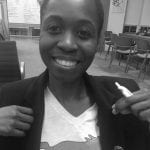 Clara Rulegura Ford, Kijiji Innovative Sustainable Solutions: a customized approach towards sustainable rural development in Tanzania * (2019)
Clara Rulegura Ford, Kijiji Innovative Sustainable Solutions: a customized approach towards sustainable rural development in Tanzania * (2019)
 Katherine Linares, Comparison and Contrast of Dallas Urban Green Spaces (2019)
Katherine Linares, Comparison and Contrast of Dallas Urban Green Spaces (2019)
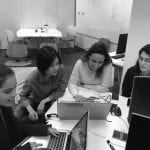 Leland Quinter, Assessment of Sustainable Design for US Air Force Infrastructure: Flying Squadron Operations Center, Germany (2019)
Leland Quinter, Assessment of Sustainable Design for US Air Force Infrastructure: Flying Squadron Operations Center, Germany (2019)
Huize Zhang, Sponge City: A Comprehensive Benefit Evaluation (2019)
Liomari Diaz, Dallas’ Urban Forest: Contributing to the Triple Bottom Line * (2019)
Sofia Bastides, Eco-Valuation Systems and Creative Approaches for Environmental Data Sharing in Puerto-Rico (2019)
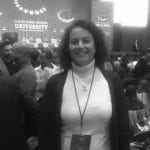 Keshvar Buhariwalla, Sustainable Gift Giving * (2018)
Keshvar Buhariwalla, Sustainable Gift Giving * (2018)
Create a platform that enables meaningful gift giving, with sustainable practices. DonatedInYourName.org promotes sustainable gift giving and is the perfect answer to the question: “What do I get someone who has everything?” The gift giver is able to donate to a charitable organization and a clay tile is presented as a symbolic gift, keeping the joy in giving! Implementation of DonatedInYourName.org will help maintain the joy and pleasure of giving and receiving gifts, increase charitable donations, create a workstream for an underserved population and allow for sustainable gift giving.
Lori de la Cruz Lewis, Sustainability: Designing Interdisciplinary Opportunities for Teaching * (2018)
Christian Mayer Garcia, Assessing Resilient Infrastructure along the River in Monterey (2018)
Nic Raven, Energy Solutions for Refugee Camps (2018)
Olivia Whittaker, Complete Streets in Rural Communities: Improving walking and Biking in Kearney NE (2018)
2018
Estella Cota, Walking in the Westside: Completing & Evaluating a Walkability Assessment for San Antonio’s Westside, (2018)
Taylor Harvey, Feasibility & Prospective Impact of Implementing Solar Energy on the SMU in Taos campus, (2018)
Michelle McClure, Feasibility & Prospective Impact of Implementing Solar Energy on the SMU in Taos campus, (2018)
Tracie Humes, Health and Wellness Design Impacts in the Built Environment applied To Dallas County Records Renovation, (2018)
Charran James, Connected | Collaborative| Communal: how smart technology can inform education building design, (2018)
Suzanne Massey, The 4 ft. Perspective: Engaging Young People in Walkability, Mapping and Grass Roots Community Empowerment and Engagement, (2018)
Anya Volchkov, The Influence of Social Engagement on Turnover rates in Low-Income residential communities, (2018)
Alex Stellato, Alternative Energy Measurements for Taos Campus, (2018)
DeVincent Martin, South Dallas Fair Park: A Journey of Trust-Building to Initiate Geo-mapping of Local Assets within a Food Desert, (2017)
Rebecca Tudor, Light Rail and TOD: Sustainability Opportunities and Obstacles Along DART’s Red Line, (2017)
Nathaniel Kho, Sustainable resiliency within a floodplain area- A retrofit of green development in a forgotten part of town, (2017)
Allison Henry, Tiny Living: An Alternative, Sustainable Housing Solution, (2017)
Brigide Marion Sobieraj, Sustainable Fashion Processes; Steps and Research Towards a Sustainable Clothing Product, (2017)
Qinning Yao, Applications of GIS in Street Trees Planning and Planting: Jubilee Park Neighborhood, (2016)
Milagros Tagle, University of North Texas Community Garden: A case study, (2016)
Jason Smith, Impact of the 2015 International Energy Conservation Code on the Community, (2016)
Seaver Myers, Historical & Sociological Perspective of Waste, Transportation & Urban Sprawl: West Dallas Case Study, (2016)
Harris Ngwo Anja, Sustainability Assessment of PV Street Lighting in Mamfe Municipality, Cameroon, (2015)
John Leos, The Woodlands: Retrospective to its Sustainable Future, (2015)
Capstone award winning participants at CGIU: Clinton Global Initiative University
2021 SDP participants: 2020 MASD participants: Lauren Melendez, Dominic Dominguez, Paka Davis, Clara Rulegura Ford, Rodney Fanner; 2018 MASD participants: Cindy Hua, Liomari Diaz, Keshvar Buhariwalla, Lori de la Cruz Lewis

